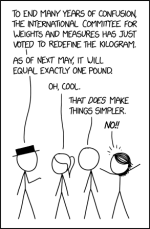Jokodo
Veteran Member
Kudos. Your steadfast stubbornness in being wrong and refusing to ever learn anything is a sight to behold.
What?
skepticalbip said imagine would it mean if those who originally defined "gram" had defined it otherwise. Zhe said it (mass) isn't a physical phenomena.
Since when is physics not about natural physical phenomena?
When James Watt used the relative term horsepower as a common denominator to help people grasp the comparison between how much work a steam engine could do, he didn't ask people to vote on his experimental data.
And no one in the sciences is using "horsepower" anymore, at least not in the original sense of "the work that can be done by one horse". Among other things, because horses come in all sorts of sizes and strengths, so, other than giving a rough order-of-magnitude estimation, it's pretty useless.
Where it is still used, it's defined - arbitrarily - as a specific fraction of a kW; the kW in turn is derived from meter, second, and kilogram, but those again are arbitrarily defined, and always have been.
We don't vote on how many foot/pounds of work per hour equal 1 kW
'We' do (or did decades ago); you and I didn't get a vote, but that does nothing to remove the arbitrariness. Unless you think the people sitting on the standards committees back then are gods.


